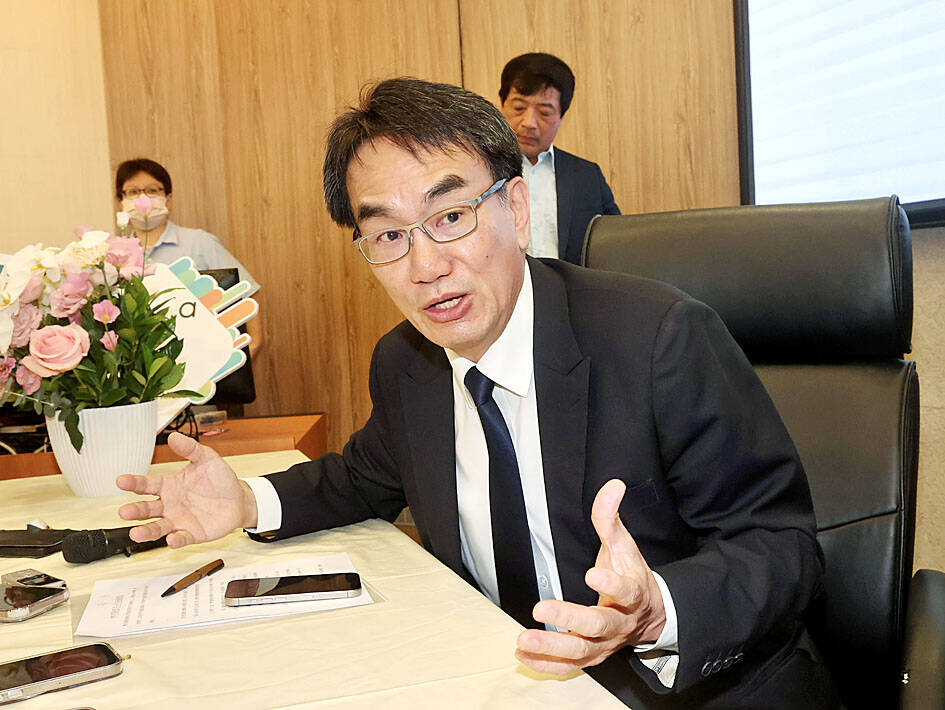The Ministry of Digital Affairs (MODA) aims to build an artificial intelligence (AI) ecosystem as part of efforts to improve the country’s industrial environment, Minister of Digital Affairs Lin Yi-jing (林宜敬) said yesterday.
Speaking with reporters, Lin, who assumed the post last week in a Cabinet reshuffle, said that to achieve the goal of setting up an AI ecosystem in Taiwan, the ministry would implement measures covering computing, data usage, talent cultivation, marketing and funding to help the country develop stronger software capabilities.
As a first step, Lin said that the ministry would provide GPU computing, referring to general-purpose computing on graphics processing units, to AI start-ups in Taiwan free of charge.

Photo: CNA
The ministry would also revise laws to allow civil servants to release government data containing no sensitive or personal information, and plans to establish a Taiwan sovereign AI training databank for start-ups to use, Lin added.
On talent development, Lin said the ministry would release guidelines on AI professional recognition to serve as a foundation for training organizations and employers, with the aim of expanding the local AI talent pool.
The ministry would also help AI developers market their products and find business opportunities in the healthcare, long-term care and manufacturing sectors, Lin said.
“We hope AI start-ups will secure large and stable orders as soon as possible,” he said.
In addition to building an AI ecosystem, the ministry would work with private firms to improve cybersecurity resilience and establish a domestic cybersecurity supply chain by leveraging Taiwan’s strengths in the cybersecurity and integrated circuit industries, Lin said.
While the ministry has tightened regulations to block fraudulent advertisements and developed technologies to prevent fraud, Lin said it would also seek cooperation on the issue with international tech giants such as Google, Meta Platforms Inc and Line Corp.
Those companies “have to join the government to fight the anti-fraud war and cannot be just bystanders” when doing business in Taiwan, he said.
Meanwhile, the Ministry of Economic Affairs has planned NT$10 billion (US$325 million) in financial assistance for AI start-ups to invest in growth and marketing, paving the way for them to secure global market share and potentially pursue stock market listings.
Separately, Lin said the MODA would continue to promote the “Taiwan Digital Identity Wallet,” which would provide a secure mobile app for digitally storing and managing personal information and identity documents.
The digital identity wallet would better protect personal privacy and boost Taiwan’s efficiency as a digital economy, Lin said.

Shiina Ito has had fewer Chinese customers at her Tokyo jewelry shop since Beijing issued a travel warning in the wake of a diplomatic spat, but she said she was not concerned. A souring of Tokyo-Beijing relations this month, following remarks by Japanese Prime Minister Sanae Takaichi about Taiwan, has fueled concerns about the impact on the ritzy boutiques, noodle joints and hotels where holidaymakers spend their cash. However, businesses in Tokyo largely shrugged off any anxiety. “Since there are fewer Chinese customers, it’s become a bit easier for Japanese shoppers to visit, so our sales haven’t really dropped,” Ito

The number of Taiwanese working in the US rose to a record high of 137,000 last year, driven largely by Taiwan Semiconductor Manufacturing Co’s (TSMC, 台積電) rapid overseas expansion, according to government data released yesterday. A total of 666,000 Taiwanese nationals were employed abroad last year, an increase of 45,000 from 2023 and the highest level since the COVID-19 pandemic, data from the Directorate-General of Budget, Accounting and Statistics (DGBAS) showed. Overseas employment had steadily increased between 2009 and 2019, peaking at 739,000, before plunging to 319,000 in 2021 amid US-China trade tensions, global supply chain shifts, reshoring by Taiwanese companies and

Taiwan Semiconductor Manufacturing Co (TSMC) Chairman C.C. Wei (魏哲家) and the company’s former chairman, Mark Liu (劉德音), both received the Robert N. Noyce Award -- the semiconductor industry’s highest honor -- in San Jose, California, on Thursday (local time). Speaking at the award event, Liu, who retired last year, expressed gratitude to his wife, his dissertation advisor at the University of California, Berkeley, his supervisors at AT&T Bell Laboratories -- where he worked on optical fiber communication systems before joining TSMC, TSMC partners, and industry colleagues. Liu said that working alongside TSMC

TECHNOLOGY DAY: The Taiwanese firm is also setting up a joint venture with Alphabet Inc on robots and plans to establish a firm in Japan to produce Model A EVs Manufacturing giant Hon Hai Precision Industry Co (鴻海精密) yesterday announced a collaboration with ChatGPT developer OpenAI to build next-generation artificial intelligence (AI) infrastructure and strengthen its local supply chain in the US to accelerate the deployment of advanced AI systems. Building such an infrastructure in the US is crucial for strengthening local supply chains and supporting the US in maintaining its leading position in the AI domain, Hon Hai said in a statement. Through the collaboration, OpenAI would share its insights into emerging hardware needs in the AI industry with Hon Hai to support the company’s design and development work, as well